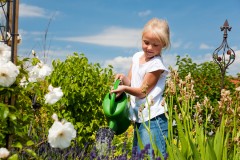As a society, we are aware of the different techniques we can use to ensure that our homes are eco-friendly and we are becoming more environmentally conscious all the time. However, we are not always as vigilant when it comes to looking after our gardens. From pesticides and chemicals, to soil and garden sheds, there are lots of aspects of garden maintenance that you can change to keep your gardening eco-friendly. This isn’t always an easy task, but taking note of some of these green tips will help you maintain your garden all year round.
Pest Management
One aspect of garden management that causes a lot of debate is the way that we manage pests. It used to be that we would just go to nearest hardware store, buy a load of chemicals and douse your garden with pesticides. However, there are lots of alternatives when it comes to pest management that are environmentally friendly, and cause the least amount of harm to insects. One that many scientists recommend is an “Integrated Pest Management” strategy, whereby gardeners keep pests at bay with minimal use of pesticides. Instead, a lot of planning and natural control is used in order for plants to stay as healthy as possible. By frequently checking your plants, you may be able to get rid of pests by hand instead of waiting till they are infested and need more extensive treatment.
Eco-Friendly Soil
Many people don’t realize that traditional commercial soil isn’t particularly eco-friendly. Most commercial potting soil is made from peat which is a non-renewable resource which comes from wetlands and swamps and can only be found in certain parts of the world. As it is so good for cultivating plants, it is a common component in traditional potting soil. The UK used to have a large proportion of peat bogs, but as they have been harvested so much over the years, a lot of peat has been lost forever as once it’s harvested, it’s very hard to grow back. There are other alternatives to using traditional commercial soil, such as coconut coir. This is a natural byproduct of the coconut industry and it isn’t used as a fuel or as food and it promotes plant health. So when it comes to buying soil for your garden, maybe see what other alternatives are available to ensure your garden is as eco-friendly as possible.
Garden Shed
Garden sheds are usually seen as a staple element of any back garden, and are useful for an abundance of reasons. But when purchasing a shed it’s important to be aware of where it is sourced from to ensure that it is ethically produced and environmentally friendly. When checking out which supplier to get a shed from, make sure you check out if they are accredited in government and forestry protection schemes such as the FSC, PEFC and CPET.
These schemes ensure that shed suppliers work with sawmills and timber companies that regulate the harvesting of timber to ensure all source material is legal and sustainable. These schemes ensure that the forest management is committed to minimising harm to ecosystems, maintaining forest productivity, ensuring forest ecosystem health and vitality and maintaining biodiversity therefore ensuring an overall balance of social, environmental and economic interests. We can see that buying a garden shed from the right supplier is vital, to ensure that the least amount of environmental damage is done.
We can see that there is more we can do to ensure we are practicing eco-friendly methods in our garden management, whilst still looking after plants efficiently and effectively.
This guest post was written on behalf of Tiger Sheds an online garden shed retailer who are supporters of environmentally friendly gardening techniques.
Photo: Little girl watering the flowers in the family garden at a summer day, very rural scene on Bigstock

Leave a Reply